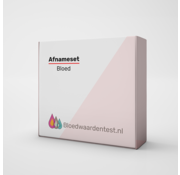Candida Albicans IgG
Candida Albicans IgG fungal infection.
Candida fungal infection
Candida is a fungal infection caused by yeast-like fungi. One yeast commonly found in humans is Candida albicans. This yeast is present in almost everyone as a normal resident of the skin, mouth, intestine and vagina and forms a certain balance with the bacteria present there. Due to various factors, this yeast can start to form threads. From that moment on one speaks of a fungus. This can happen under the influence of medication (antibiotics), when the immune system is weak or due to the presence of parasites.
In some cases, a Candida yeast infection is very stubborn and keeps reappearing. It can be very annoying and persistent and come back often. A Candida infection is a common and underestimated problem that can be responsible for months or even years of chronic symptoms.
Although the yeast can be transmitted from one person to another (for example, from mother to child or vice versa, between sexual partners), it is not really an infection in the traditional sense of the word. Candida is therefore not considered a contagious disease, much less a sexually transmitted disease. Therefore, the partner of someone with a vaginal candida infection does not need to be co-treated unless he or she is also infected and has symptoms. For babies with thrush, or when a breastfeeding mother has a candida infection of the nipples, both mother and child should be treated because they can pass the infection to each other.
Candida's are fungi that consist of several species. Candida albicans is the best known form. The collective name of different types of candida is called candidiasis.
Symptoms
A Candida infection can be accompanied by up to 50 different symptoms. By no means all of these symptoms are present in all people who have a Candida infection. Also, not all symptoms are caused by Candida alone. The average Candida victim often suffers from multiple symptoms.
The first signs are often bloating, constipation, flatulence, abdominal cramps and anal itching. Since the genitals are close to the anus, this is one of the places where the Candida can cause infections (itching). At a later stage, the Candida breaks through the protective mucus layer in the intestines and enters the blood. It now travels through the body and grows into a true plague that can cause many symptoms.
Here is a list of possible symptoms:
- gastrointestinal complaints
- bloating
- flatulence
- burning sensations on the body
- Allergies (chronic blocked nose, asthma, hay fever, skin rash and itching)
- recurrent infections
- constipation or diarrhea
- distended abdomen
- menstrual disorders and premenstrual complaints
- white tide
- recurrent bronchitis
- bad breath
- cystitis
- burning urine
- prostate complaints
- recurrent eye infections
- spots in front of the eyes
- earache and deafness
- thrush (white deposit in the mouth)
- joint pain and/or swelling
- difficulty speaking
- worsening of the symptoms due to moisture
- Chalk Nails
- foot fungus
- swimmer's eczema
- itching in groin
- fungal infections on the skin or nails
- fast-emerging bruises
- tingling and numbness, for example in the fingers
- heartburn
- food intolerance
- dull and malodorous hair
- Complaints arising from certain odours, deodorants, perfumes, cigarette smoke, petrol vapour.
- sweaty feet
- hypoglycaemia
- acne
- cough
- headaches and/or migraines
- hair loss
- hay fever
- eczema
- psoriasis
- reduced sex drive
- impotence
- fatigue
- complaints that increase in damp, stuffy and mouldy spaces
- cravings for sugar, bread or alcohol
- inflammations on genitals
- anal itching
- abdominal cramps
- vaginal itch
- sinusitis
- itchy skin
- muscle complaints
- feverish symptoms
- spot
- mood swings
- float
- dry mouth
- earache / infections
- mouth blisters
- hemorrhoids
- asthmatic symptoms
- constantly dripping and/or itchy nose
- painful and/or tense feeling in the chest area
- painful intercourse
The symptoms can give a very confusing picture, making it difficult for the doctor to make a correct diagnosis. A Candida infection is only detectable in the blood at a very late stage.
In an earlier stage candida is visible in stools with this test.
If the results are positive, we recommend that you schedule a consultation with the Candida Coach. She can work with you to create a treatment protocol.





